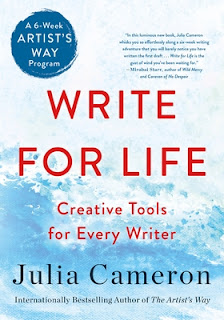Julia Cameron's Write for Life is an inspirational and useful book full of warm and cozy essays, filled with tidbits on nature and her dog Lily, as she provides the gentle keys to writing. I didn't take 6 weeks to read as I wanted to find out all she had to offer, sooner than later.
She begins with the beneficial reminder that morning pages are essential in letting your words flow on the page, artist dates are needed to fill the well as it empties, and walking helpful to your health and imagination.
"Morning pages train us to take risks. They dare us to move outside our comfort zone... They are a tough love friend. They challenge us to change our size, to become larger, more daring... They urge us to be more honest, to take action where action is needed... "
You aren't being negative, "You're ventilating the negative feelings, not increasing them." And in the pages, "we face our demons, and when we do, we find we have room for new and positive endeavors."
I found the morning pages to be beneficial over the years in working out problems, both with my family, and with my characters. I stopped doing them again but committed to taking them up once again. True story. This past week I set my alarm to go off 15 minutes early so I would have time to write before work, and found myself getting to work 10 minutes late. Good think I'm the boss. LOL!
After your morning pages, she recommends setting an easy daily quota of two to three pages, and 'laying tracks', slowly and steadily from a to b to c. And schedule your writing by your mood rather than the time of day and grabbing time, rather than waiting for the big chunk of time that you're never going to find.
I went through my current WIP and figured out if I revise two to three pages five days a week, the revision will be done at the end of August.
I highlighted quite a bit and took copious notes, talking to myself on the page, setting her advice in my head. She also provide useful advice for how to outline and revise your story once the first draft is finished, which brings clarity.
"A well executed outline resembles a train track with each entry a tie."
Which I really need to do, rather than relying on the outline in my head. I need to see the visual reminder to make it concrete and make better progress.
Although The Artist way is wonderful, Write for Life is a shorter version, told through wonderful essays which reiterates some of the ideas including synchronicity, crazy makers, toxic friends, patience, and asking for guidance. Well worth reading.
Nonfiction, Writing Life, 181

I have heard of Julia Cameron, but never read one of her books. I love to write, this one looks fantastic!
ReplyDelete